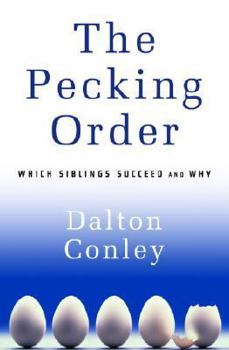The Pecking Order: Which Siblings Succeed and Why
Select Format
Select Condition 
Book Overview
The family is our haven, the place where we all start off on equal footing - or so we like to think. But if that's the case, why do so many siblings often diverge widely in social status, wealth, and... This description may be from another edition of this product.
Format:Hardcover
Language:English
ISBN:0375421742
ISBN13:9780375421747
Release Date:March 2004
Publisher:Pantheon Books
Length:309 Pages
Weight:1.35 lbs.
Dimensions:1.1" x 6.2" x 9.4"
Customer Reviews
4 ratings
You'll never look at your own family the same way again
Published by Thriftbooks.com User , 19 years ago
Conley's main point is that if you really want to improve your child's future, the best way to do it is to limit the number of his siblings. This strikes me as a result that vast numbers of Americans, not to mention people elsewhere, would do well to heed. I constantly hear people people in the news complain that they can't support their families as they would like to, asking for government help. Then you find out that they have four children, or six, or ten. Well, duh! At times this book seemed like a tour through my own family dynamics. I am the youngest of seven brothers and sisters. In my experience it is quite true that family resources get spread very thin in that situation.
Interesting but Incomplete
Published by Thriftbooks.com User , 20 years ago
This book was a very interesting read with a disappointing conclusion. Conley presents convincing evidence for which siblings succeed and why, but lacks an effective ending making the book feel incomplete. It is as if the author is afraid to make a solid statement about what his findings mean. Still, there is a lot of good information here and I would recommend it to anyone interested in this topic with the understanding that it isn't particularly well written.
Highly Recommended! Great Food for Thought
Published by Thriftbooks.com User , 20 years ago
I was inspired to read this book after a couple of friends of mine bought it and loved it. I wasn't sure what to expect, because I've always been a bit suspicious about the whole pop-psych birth-order thing. However, this book not only validated my suspicions about putting too much stock into that (Conley doesn't believe in birth-order theories, either), it also did a great job of addressing the myriad of factors that can (and do) affect sibling outcomes and family relationships. What I like best about the book is that it approaches such a complex topic without oversimplifying or dumbing things down. It does a great job of integrating sociological insights into real world phenomena (something that academic disciplines don't always do, unfortunately). Besides that, it's written engagingly-- Conley really knows how to hold his audience, and he strikes exactly the right balance between academic-speak and common sense. This book will make you think in new ways about why you and your siblings have turned out differently. Forget those simplistic, personality-based reasons you've been holding on to; there's way more to it than that!
The Common Sense Approach to Siblings' Success
Published by Thriftbooks.com User , 20 years ago
You and your siblings probably grew up together in the same areas, attending relatively the same schools, with the same set of parents/step-parents/step-siblings, etc., and you both were set in probably a similar socioeconomic background for most of your lives before the age of 18. Yet you are very different people, with very different careers, experiences, higher education backgrounds, and families.Why. Some researchers claim that birth order makes all the difference- others like to throw gender into the equation. Even others say that the ever mystifying gene pool is responsible for every difference between siblings. In "The Pecking Order", Dalton Conley proposes a new idea; Not so much that one variable is responsible for all differences, but that many variables factor into siblings' different experiences growing up and make them the adults they grow to be. You say, this is common sense! Yes it is, and it's hard to believe it's taken this long for a researcher to propose that idea.The extensive research of Conley and his team is manifested in this book. Conley explains the many different variables in detail and how they affect siblings- the gene pool, birth order, family size, gender, death, desertion, divorce, immigration, family migration, socioeconomic change, and random acts of kindness/cruelty performed by those not within the family circle. The book not only contains the factual research of Conley's team but also the interviews and stories of sets of siblings from every background imaginable, and how their different experiences affected their outcome as an adult. The interviews add a level of the personal to the book, and they validate the authenticity of the research findings. The information is impressive in and of itself, but Conley's writing style makes for a casual, one-on-one teacher to student type reading environment. He also includes an expansive, 100+ page assortment of his appendix, notes, sources, and index. These are very helpful if you'd like to dive more into the subject.Conley also reminds us that how siblings turn out is truly subjective- to all of the reasons he lists as well as how people turn out in general. Very well-written, very informative, and by the end you are examining yours and your siblings' childhood experiences in a new light.JK





